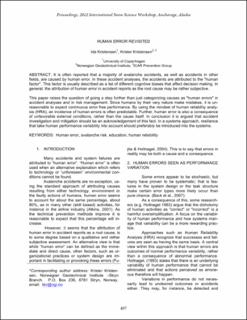Human error revisited
Abstract
It is often reported that a majority of avalanche accidents, as well as accidents in other fields, are caused by human error. In these accident analyses, the accidents are attributed to the "human factor". This factor is usually described as a list of different cognitive biases that affect decision making. In general, the attribution of human error in accident reports as the root cause may be rather subjective. This paper raises the question of going a step further than just categorizing causes as "human errors" in accident analyses and in risk management. Since humans by their very nature make mistakes, it is unreasonable to expect continuous error free performance. By using the mindset of human reliability analysis (HRA), an incidence of human errors is often predictable. Further, human error is also a consequence of unfavorable external conditions, rather than the cause itself. In conclusion it is argued that accident investigation and mitigation should be an acknowledgement of this fact. In a systems approach, resilience that take human performance variability into account should preferably be introduced into the systems.
